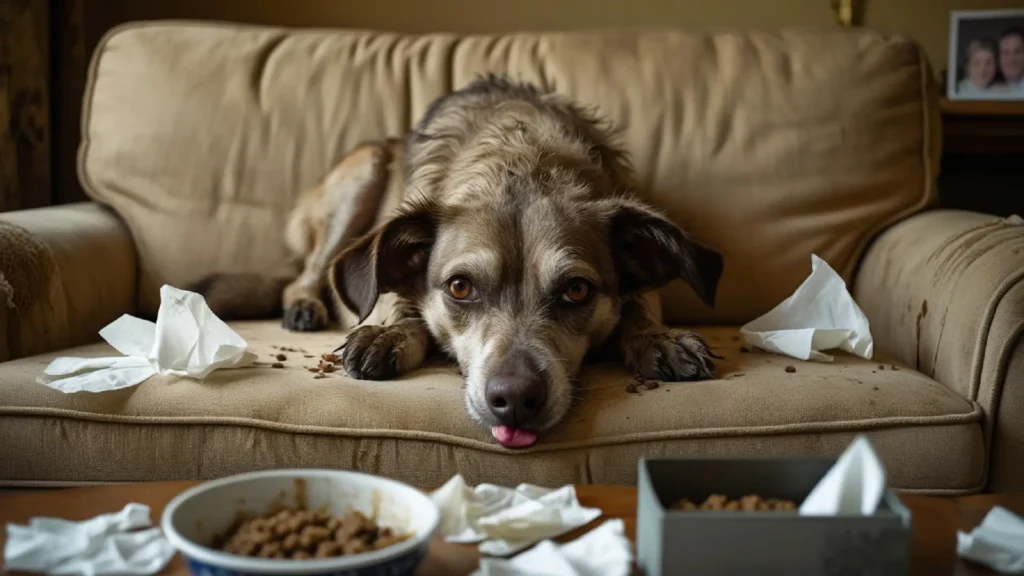The causes of an upset stomach in dogs range from mild to serious. It’s important to understand what might be causing the discomfort. By recognizing the potential triggers, you can take the appropriate steps to help your dog recover quickly.
How Do You Understand Your Dog Stomach is Upset
Dogs shows signs when their stomach is upset. Here are the common signs of an upset stomach in dogs:
Vomiting: Frequent or occasional vomiting is a clear sign of an upset stomach.
Diarrhea: Loose, watery stools or diarrhea can be a common symptom of an upset stomach. If diarrhea lasts more than a day, it’s important to consult your vet.
Loss of Appetite: Dogs with an upset stomach sometimes show a decreased interest in food. This could be a sign that they’re feeling nauseous.
Abdominal Discomfort: Dogs with stomach upset often exhibit signs of abdominal pain, such as:
- Whining or growling when their stomach is touched.
- Acting sensitive around their belly.
- Keeping their body in an unusual posture to avoid discomfort.
Bloating: If your dog’s abdomen appears swollen, they may be experiencing bloating.
Flatulence: An increase in gas, often with a particularly foul odor, is another sign of an upset stomach.
Lethargy: Dogs with stomach issues may become more tired than usual. If your dog is lethargic, uninterested in playing, and not responding to activities they typically enjoy, it could be a sign that they’re feeling unwell.
Changes in Poop: If your dog’s stool is abnormal (watery, bloody, or mucusy), it can be a sign of digestive distress. Bloody and tarry stools can indicate internal bleeding.
Causes of Upset Stomachs in Dogs
This guide explores the common causes of upset stomachs in dogs, so you can better identify what might be affecting your pet and when to seek veterinary care.
Dietary Indiscretion
Dietary Indiscretion refers to when a dog eats something it shouldn’t. This leads to an upset stomach. This habit irritates their digestive system. Here’s how dietary indiscretion upsets a dog’s stomach:
Ingestion of Spoiled Food: Dogs sometimes eat food that is actually garbage, or scraps from human meals. Spoiled food may harbor bacteria, mold, and other pathogens, all of which can lead to food poisoning or gastrointestinal upset.
Eating Non-Food Items: Some dogs engage in pica, a behavior where they eat non-food objects like socks, rocks, plastic, and fabric. These items can get stuck in the stomach or intestines, causing blockages, discomfort, and perforations in the digestive tract.

Fatty Foods: Many dogs find bacon, fatty meats, and high-fat snacks irresistible. While these foods are tasty, they are difficult for a dog’s stomach to process and can cause inflammation in the digestive tract.
Food Intolerances
Just like humans, some dogs have allergies to certain foods, which can lead to gastrointestinal issues. Some common food allergens in dogs include:
Grains -such as corn, wheat, or soy
Dairy -some dogs can’t digest lactose properly
Certain proteins -beef, chicken, lamb
Additives and preservatives -artificial colorings, flavorings, or chemicals in processed foods
Eating Too Quickly
Eating too quickly can upset a dog’s stomach for several reasons, many of which are related to how the digestive system processes food. Here are some key factors:
Inadequate Chewing: Dogs don’t chew their food properly when eating too quickly. Chewing is an important part of digestion. It breaks down food into smaller, manageable pieces. This makes it easier for the stomach to process and digest the food. If food isn’t chewed properly, larger chunks enter the stomach, which leads to indigestion.
Swallowing Air: Dogs that eat quickly tend to swallow a lot of air along with their food. This condition is called aerophagia. Aerophagia causes bloating, gas, and discomfort in the stomach. In severe cases, it can even contribute to a dangerous condition called gastric dilatation-volvulus (GDV). This is a life-threatening emergency that requires immediate veterinary attention.
Overloading the Stomach: Eating too much food too quickly overwhelms the stomach’s ability to digest properly. The stomach needs time to produce enough hydrochloric acid and enzymes to break down food. If food enters the stomach too rapidly, it may not be digested efficiently. This causes indigestion, vomiting, and diarrhea.
Rapid Gastric Emptying: When a dog eats quickly, food moves through the stomach and into the intestines faster than normal. This rapid gastric emptying causes irritation in the gastrointestinal tract, and leads to stomach upset.
Toxins
Toxins ingestion causes stomach upset in dogs. Some common toxins include:
Chocolate: Chocolate contains theobromine, which is toxic to dogs.
Plants: Many common houseplants and outdoor plants (like lilies, oleander, and ivy) are toxic to dogs.
Medications: Certain human medications and antidepressants are toxic to dogs.
Chemicals: Household cleaning products, antifreeze, and pesticides can poison a dog if ingested.
Insecticides and Rodenticides: Rat poisons and insecticides causes severe gastrointestinal symptoms, organ failure, and even death if ingested.
Infections

Infections can result from bacterial, viral, and parasitic agents that affect the digestive system. Some of the most common infections include:
Bacterial infections: Conditions like salmonella, E. coli, and Clostridium can cause stomach upset, vomiting, diarrhea, and fever. Dogs can ingest these bacteria by consuming contaminated food and water.
Viral infections: Parvovirus is a severe viral infection that causes vomiting, diarrhea, and dehydration.
Canine distemper: A viral infection that can cause digestive, respiratory, and neurological issues.
Leptospirosis: A bacterial infection that can cause liver and kidney damage, along with digestive upset.
Parasites
Several types of parasites can affect a dog’s stomach and gastrointestinal (GI) tract. These parasites can be internal or external. But the ones that primarily affect the stomach and intestines are internal parasites. Below is a list of common gastrointestinal parasitesthat can impact a dog’s digestive system:
Roundworms: Roundworms are one of the most common intestinal parasites in dogs. Adult roundworms live in the small intestine, where they feed on partially digested food. Large numbers of roundworms cause blockages in the intestines and stomach upset.
Hookworms: Hookworms attach to the lining of the small intestine and feed on blood. This can cause significant blood loss, leading to anemia, especially in young puppies. They can also irritate the intestinal lining, causing inflammation and digestive upset.
Giardia: Giardia is a protozoan parasite that infects the intestines, particularly the small intestine. It causes inflammation and disrupts the normal absorption of nutrients and water, leading to diarrhea in dogs.
Stress
Stress significantly impacts a dog’s digestive system. Dogs respond by releasing hormones when they are in stress. These hormones disrupt normal digestive processes, leading to symptoms such as vomiting, diarrhea, loss of appetite, and abdominal discomfort.
Here’s a detailed explanation of how stress affects a dog’s stomach and digestive system:
Fight-or-Flight Response: When a dog experiences stress, the body activates the fight-or-flight response. This is controlled by the sympathetic nervous system. This response prioritizes survival over non-essential functions. For this reason, blood flow is redirected away from the digestive tract and toward muscles, heart and brain. This reduced blood flow to the stomach.
Hormonal Changes: Stress can increase the production of stomach acid, which may lead to acid reflux, gastritis (inflammation of the stomach lining), or ulcers. Cortisol disrupts the balance of beneficial bacteria in the gut, which leads to dysbiosis. Dysbiosis causes bloating, gas, diarrhea, and constipation.
Pancreatitis
Pancreatitisis a condition where the pancreas becomes inflamed, and it can lead to significant stomach upset in dogs. Pancreatitis leads to a cascade of digestive and systemic issues. Here’s a detailed explanation of why pancreatitis causes stomach upset in dogs:
Premature Activation of Digestive Enzymes: In pancreatitis, the enzymes are prematurely activated within the pancreas itself, causing the pancreas to “digest” its own tissues. As the pancreas becomes inflamed and damaged, it releases inflammatory substances and toxins into the surrounding tissues. This causes abdominal pain.
Reduced Enzyme Production: Pancreatitis reduces the ability to produce digestive enzymes. Without sufficient enzymes, food cannot be properly broken down in the small intestine. Undigested food can sit in the stomach or intestines for longer periods. This causes gas buildup in the stomach.
While occasional stomach upset in dogs is usually not a cause for alarm, it’s important to monitor your dog’s symptoms and behavior closely. Understanding the potential causes will help you provide the best care for your pet. If your dog’s upset stomach persists, worsens, or is accompanied by severe symptoms, don’t hesitate to contact your vet for advice and treatment.




